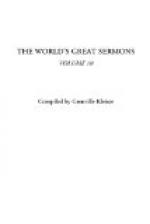Consider the way in which the psalmist reached this pure faith in God and in His people. A factor in the process was distaste for the ugly rites of idolatry—“Their drink-offerings of blood will I not offer.” Idolatry always develops a loathsome ritual. Sometimes it is cruel and sometimes it is horribly unclean, but it always debases the worshiper’s mind, confuses his conscience, and hampers his freedom and energy by the burdensome ceremonies it imposes upon them. Standing afar off from them as we do, and knowing that there is no heathen religion but has something good in it, we are apt to think that it does not in the least matter how crude or how material a nation’s faith be if only it be faith in something more powerful than themselves, if it satisfy their consciences and have some influence in disciplining society and helping the individual to control himself. But you have only to see idolatry at work, and at work with the habits of ages upon it, to recognize how terrible it can be in its identification of sheer filth and cruelty with the interests of religion, and how it at once demoralizes and paralyzes its adherents. To see it thus is to understand the passionate horror of these words: “Their drink-offering of blood will I not offer.”
It is, however, no mere recoil from the immoral which started the spring of this psalmists’s faith in God. That faith was formed on personal experience of God Himself. In simple but pregnant phrases the psalmist tells us how sure he has become, first, of God’s providence in his life; secondly, of God’s intimate communion with his soul. God, he says, had been everything in his life. One does not know whether the psalmist was a prosperous man or a poor one; the inference that he was prosperous and rich has sometimes been drawn, but wrongly drawn, from one of the verses of the Psalm. His indifference to that is clear, but what he did have he knew he had from God. God, he says, is all his happiness and all his strength—“The Lord is the portion of mine inheritance and of my cup; thou maintainest my lot.” Whether poor or prosperous he could say: “The lines are fallen unto me in pleasant places; yea, I have a goodly heritage.” Now that assurance of divine leading is not analyzable, but we know that it does grow up solid and sure in the experience of simple men who have put their trust in God, who have felt life to be a commission from Him and who have done their duty obeying His call. With such men “all things work together for good.” Tho life about them shake and darken, they feel their own solidity and have light enough to read the future. Tho stript and stark, they feel the Lord Himself to be the portion of their inheritance and of their cup. The portion of my inheritance the Lord is, i.e., the little bit of land that fell to each Israelite as his share in the promised inheritance of the nation. “The Lord is the portion of mine inheritance,” as we might say in our Scotch language, “The Lord is my croft and my cup,” so they find in Him all the ground and the freedom they need to do their work, fulfil their relationships, and develop their manhood.




